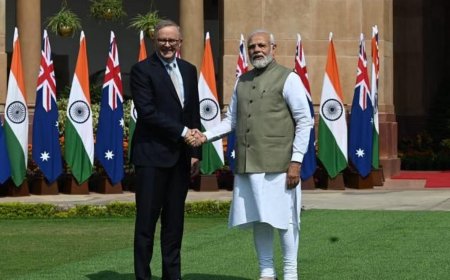Australian Universities Oppose Migration Reforms | Australia Study Visa Updates
Universities and educational providers are strongly opposing migration changes, labeling them as highly interventionist and restrictive, affecting both where and what international students can study.

The head of the Independent Tertiary Education Council criticizes the reforms as "horrible on every level" and "regressive." Following a meeting with key ministers and education councils, the government has set January 1 as the deadline for implementing new upper limits on the number of international students each educational institution can enroll.
While amendments to the Education Services for Overseas Students Act are anticipated, specifics on the caps are yet to be disclosed.
A draft document outlining the principles guiding the changes aims for greater diversity among international student cohorts, targeting universities with largely homogeneous student bodies, especially from countries like China. It raises concerns over courses taught predominantly in Mandarin.
Whether private colleges or city-based campuses of regional universities, teaching only a few subjects to international students, will be asked to alter their enrollment patterns is still uncertain. The draft suggests new providers intending to teach international students must show they've previously delivered courses to domestic students to demonstrate a commitment to quality education.
The government announced that education providers would face a cap on international student enrollments, allowing exemptions only for those with new student accommodation projects. Although a growth target of 5% per year has been set, the exact reduction desired remains unspecified, leaving providers uncertain. With government forecasts projecting net migration at 250,000 in 2024-25, down from 510,000 in 2022-23, there is significant concern within the sector.
The CEO of the International Education Association of Australia expressed concern over the changes, advocating for a comprehensive consultation period. He noted that the January 1 implementation date was the best negotiated.
Criticism within the sector has been aimed at what's described as a "chaotic approach" to policy, with measures introduced to tackle visa system abuse while reducing overall student numbers.
Policy changes have included limitations on work hours for student visa holders, increased financial requirements, higher English-language standards, and increased regulatory powers to shut down dubious providers.
The upcoming budget is expected to raise student visa costs, though a proposed "tax" on international students may have been dropped.
The government's approach has been criticized, stating it reflects a disjointed strategy where tertiary education reform, migration, and population strategies lack coherence.
What's Your Reaction?
 Like
0
Like
0
 Dislike
0
Dislike
0
 Love
0
Love
0
 Funny
0
Funny
0
 Angry
0
Angry
0
 Sad
0
Sad
0
 Wow
0
Wow
0







































































































